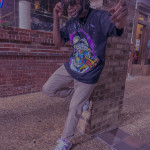What started as a passion project among friends eventually evolved into a full-fledged creative vision. From leading a Metalcore band, Scream in Rage, to experimenting with Melodic Hardcore, the road was far from smooth, but it was in the setbacks that the essence of SVICIDVL was forged.
A defining moment came through a collaboration with Alex Tena, a renowned guitarist and producer in the Spanish metal scene. Their bond, built on a mutual need to create, has shaped SVICIDVL for over five years now. The project isn’t just about making music—it’s a relentless urge to craft sound, to translate emotions into sonic waves, and to explore the abyss that lies beneath the surface of human experience.
A Dark and Unstable Sound
SVICIDVL isn’t confined to a single genre—it’s a concept, a constantly evolving fusion of Metalcore and urban influences. With a foundation rooted in the intensity of heavy music, the project is also deeply inspired by Spanish urban sounds and American darktrap, taking cues from artists like KAAMARA and Grim Salvo, while also channeling the energy of Bad Omens, BMTH, and Thornhill.
The music embodies primal emotions—depression, fear, despair, and the existential struggles of a generation lost in a crumbling system. It gives a voice to those who feel like they have nothing left to lose, turning personal wounds into a raw, unapologetic soundscape. The idea isn’t just to express darkness, but to question its purpose—to ask whether the pain we endure is worth the fight.
From Pain to Music: The Art of Songwriting
Every song born under the SVICIDVL name is autobiographical, drawn from real experiences—anxiety, heartbreak, toxic relationships, and the crushing weight of capitalism. The songwriting process is an act of self-exorcism, a way to transform suffering into something tangible. Each track is an open wound that seeks healing, yet leaves behind a scar that tells a story.
Lyrically, the music carries an almost poetic brutality, often naming songs after people who have left a mark—some loved, some unforgiven. This emotional intensity extends beyond words and into the sonic and visual realms, creating a world where everything feels distorted, unstable, and broken.
Aesthetic of Ruin: The Visual Identity of SVICIDVL
Music in SVICIDVL’s universe is more than just sound—it’s a visual experience. The glitch aesthetic dominates its artwork and videos, a representation of corruption, decay, and chaos. The music doesn’t just talk about being broken—it looks broken too. The band’s visuals mirror the music: dark, fragmented, and unsettling, a reflection of a world where stability is an illusion.
The Stage: A Ritual of Energy and Defiance
For SVICIDVL, live performances are a form of catharsis, an opportunity to strip everything down to pure energy and emotion. The stage becomes a battlefield where the band and the audience connect, forgetting reality for a few minutes and diving headfirst into something visceral and unfiltered.
One of the most unforgettable moments in the project’s history was performing at a prestigious awards gala in Lisbon, where they took the stage in balaclavas in front of Europe's top festival moguls. It was a rebellious statement, a moment that defined the band’s commitment to staying true to its disruptive spirit.
What’s Next for SVICIDVL?
The band is constantly evolving, absorbing new influences, and exploring new sounds. While Metalcore remains at its core, elements of Nu Metal, trap, and industrial music continue to shape its sonic identity. SVICIDVL’s goal isn’t just to stay within a genre but to expand it, merging the underground with mainstream sensibilities while maintaining its raw, untamed soul.
Final Words: A Message to the Next Generation
For those looking to carve their own path in music, SVICIDVL offers a simple but powerful philosophy: “Fake it till you make it, and do it with passion.” The music industry demands resilience and authenticity. Chasing fame or money won’t bring real success— believing in your craft and creating for the sake of expression and survival will.
SVICIDVL isn’t just a band—it’s a testament to the idea that music is the last line of defense against self-destruction. And as long as there is something to say, the sound will keep coming.









